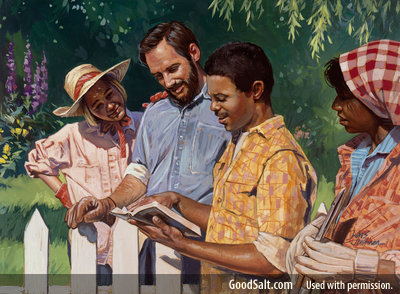“Nevertheless I tell you the truth. It is to your advantage that I go away; for if I do not go away, the Helper will not come to you; but if I depart, I will send Him to you.” John 16:7
Evangelist Larry Moyer writes, “If most of us were honest, we would admit we enjoy evangelism the most when:
• The person we plan to talk to is not home.
• God allows us to do the praying and someone else to do the talking.
• The individual we are approaching has laryngitis and therefore, it would be impolite to ask him about his relationship with Christ.
• The waitress explains to our friend that she has a phone call just as we are preparing to approach her about spiritual things.
• We unintentionally oversleep the morning of our breakfast appointment with a non-Christian.
• As soon as we approach an individual about spiritual things, he tells us he is a Christian and we of course do not want to insult him by telling him what he probably already knows.” 1
The reason for these responses is one four-letter word – FEAR. Fear does more to hinder our witness for Jesus Christ than any other single thing. As Christians, it’s not that we don’t want to share Christ with others. I believe most believers would love to lead someone to the Lord. Think about this for a moment: What would happen if each of us led someone to Jesus Christ this Christmas season? Wouldn’t that be exciting?! To see the church grow exponentially as the gospel goes out from here and changes peoples’ lives. Nothing would bless your church more than to see new believers sitting next to you because you had the courage to share Christ with them.
But it is not going to happen until we overcome this fear of sharing our faith with others. Before we talk about how to do that, let me address two things. First, if you are afraid to evangelize, raise your right hand above your head. (Pause). Now put your hand behind your head. Now pat yourself on the back. You are normal. It is normal to be afraid in evangelism. After all the apostle Paul was afraid to evangelize. When entering the city of Corinth to evangelize, Paul admits, “I was with you in weakness, in fear, and in much trembling” (I Corinthians 2:3). I’ve been sharing Christ with others for over thirty-five years and I still get butterflies in my stomach before I approach a non-Christian about spiritual things. So it is normal to be afraid in evangelism.
Second, the issue is overcoming fear, not removing it. I believe this side of heaven, there will always be times of fear. In Ephesians 6:19, Paul asked, “Pray for me, that the power to speak may be given to me, that I may open my mouth boldly to make known the mystery of the gospel” (MEV). Why did Paul ask for prayer for boldness? Because he still struggled with fear. When Paul wrote this prayer request for boldness, he was a prisoner in Rome. He already had many years of evangelistic experiences planting churches. Yet he understood, that moments of fear will always be there. Yet he shared Christ constantly not because he was never afraid, but because he learned to overcome his fear with boldness.
How can we overcome fear in evangelism? For the next few days, Lord willing, we will look atJohn 16:5-15 where we will discover some principles for overcoming fear in evangelism. The last time in the gospel of John, we saw Jesus forewarn His disciples of the world’s coming hostility and persecution of them (15:18-16:4). The disciples were now preoccupied with their own problems in the future and none of them were concerned about Jesus’ future. Christ wanted them to bear witness of Him to an increasingly hostile world. How eager would you be to speak up for Christ if your audience was likely to mistreat you, imprison you, or even kill you? Being stricken with fear is understandable with that kind of a warning from Christ (John 15:18-16:4).
If we want to overcome fear in evangelism GRASP THAT YOU ARE NOT ALONE WHEN YOU WITNESS (John 16:5-7), because God the Holy Spirit is with you and in you always. Jesus told His disciples, “But now I go away to Him who sent Me, and none of you asks Me, ‘Where are You going?’” (John 16:5).Peter had asked this question earlier (John 13:36), but then he was only concerned about how Jesus’ departure would affect him. Peter and the other disciples did not understand the significance of Jesus’ departure at this time. They did not realize Christ would have to suffer and die and be resurrected before ascending to heaven to be with His Father. Like the disciples, we tend to think only of ourselves instead of others when we are facing trouble. 2
Next Christ said, “But because I have said these things to you, sorrow has filled your heart.” (John 16:6). Understandably, “sorrow” filled the disciples’ hearts at the news of Jesus’ departure and their coming persecution and there was room for nothing else in their hearts. 3 To the disciples, Jesus’ departure and their upcoming persecution, was an awful disaster in the making and they were deeply distressed by this. Parting is painful especially when you are very dependent on the person leaving. The disciples depended on Jesus for guidance, instruction, protection and provisions, and now He was leaving them, and they would be hated by the world. We would have felt the same way.
Perhaps we would try to hide our sadness, but we would still feel the sense of loss. We can hide our grief and pain from each other, but not from the Lord Jesus. He knows our hurts and He wants to offer comfort to us.
Jesus then offers hope to His hurting disciples, “Nevertheless I tell you the truth. It is to your advantage that I go away; for if I do not go away, the Helper will not come to you; but if I depart, I will send Him to you.” (John 16:7).This is a reality check – “I tell you the truth…” Jesus says. It may feel bad, but let’s do a reality check. In reality, Jesus’ departure (His death, resurrection, and ascension) would be profitable and beneficial to the disciples and to all of us! What “advantage” would Jesus’ departure give to the disciples?
First, Jesus’ return to the Father meant He would send “the Helper,” the Holy Spirit, to indwell all believers everywhere forever (cf. John 14:16-17, 26; 15:26). Evans observes, “The Father sent the Son into the world (see 3:17), and the Son would send the Spirit into the world (16:7). Thus, the Trinitarian God is at work, each Person carrying out the next phase of His kingdom program. The coming of the Holy Spirit would benefit the disciples because his presence would not be physically limited (as Jesus’s was). He would dwell within each of them (14:17) and go with them wherever they traveled (see Eph. 1:22, 23).” 4
Jesus’ stay with them was temporary, but the Holy Spirit’s stay would be permanent. They would never be alone again! And nor shall we if we have believed in Christ for everlasting life and received the Holy Spirit at that moment of faith (John 7:37-39; Romans 8:9, 11, 13; Galatians 3:2, 26-27; Ephesians 1:13-14).
Second, as long as Jesus was with them in Person, His work would be localized, and it would be impossible for Him to communicate with them equally at all times and in all places. But the coming “Helper” would equip them for a wider and more powerful ministry! There is no place they could go where the Holy Spirit would not be with and in them.
For example, in Matthew 10, when the disciples were sent out to minister, it was necessary for them to be separated from Christ. Jesus could not physically accompany them in their ministry everywhere they went. If Jesus had remained on earth with them, He would not be able to accompany them to all the places God would lead them. But the Holy Spirit could. He would indwell them and empower them to reveal Jesus to a much greater extent than Christ would have done if He had remained with them.
This is why Jesus could promise His followers who go out into the world to make disciples, “And lo, I am with you always, even to the end of the age.” (Matthew 28:20b). There is no place we can go on earth where Jesus is not with us through the indwelling Holy Spirit. His presence can overcome our fears.
Third, while Jesus was on earth, the disciples were sometimes afraid (cf. Mark 14:50; John 6:20), but after the coming of the Holy Spirit they testified of Jesus with great confidence and boldness (cf. Acts 2:14-47; 3:11-26; 4:5-31; 5:1-11, 28-32, 40-42; et al.). If the disciples got their way, there would be no gospel because Jesus would not have died and rose from the dead. There would be no payment for our sins. If Jesus had not departed, there would have been no glorified Lord to send the Holy Spirit to apply Jesus’ death and resurrection to peoples’ hearts. The Holy Spirit’s coming depended on Jesus’ petition to the Father to send the Spirit. Christ could not ask the Father to send the Spirit until He had returned to the Father. Without the Holy Spirit, it would be like Old Testament days when the Spirit’s indwelling presence was temporary. With all things considered, believers today are more privileged spiritually than those who lived and walked with Jesus in the first century. 5
Knowing we are not alone when we share the gospel with unbelievers can replace our fear with boldness. Through the Holy Spirit, we have a power that is not our own. God’s power is manifested as we begin to share the truth of Jesus’ death and resurrection!
Many times, before I share the gospel with people, I have fears streaming through my mind: “What will they think? How will they respond? Will they reject the message and me? Will I be able to answer their questions or objections?” Knowing the Holy Spirit is with me and in me to give me the words to speak, calms my fears. After warning His disciples of severe persecution, Jesus told them, “19 But when they deliver you up, do not worry about how or what you should speak. For it will be given to you in that hour what you should speak; 20 for it is not you who speak, but the Spirit of your Father who speaks in you.” (Matthew 10:19-20). Believing Christ’s promise can dissolve our fears in evangelism.
A few years ago when we were speaking at a church in the USA, I was very nervous about sharing the gospel with the congregation because I knew that the beliefs of this particular denomination were much different than ours. Hence, I spent additional time in prayer beforehand asking the Lord to guide me and empower me. That morning, God the Holy Spirit directed me to share from Acts 16:25-31 about what the Bibles says to do to get to heaven if we only have 60 seconds to live.
At the end of the message, I gave a gospel invitation, and about 10-12 adult leaders raised their hands indicating that they were now trusting in Christ alone as their only hope of heaven. After the service, three or four people came up to me, thanking me for sharing this message with them. They told me they used to think that going to heaven was based on their works, but now they were resting in the finished work of Christ. Others said no one had ever told them God cared about their eternal destiny, but now they know He does, and they were trusting Christ to get them to heaven. After talking with these people, I bowed my heart before the Lord, thanking Him and His Spirit for His guidance and power to share this message. All the glory goes to Him!
Prayer: Lord Jesus, Your words offer such hope and empowerment as we go out into a hostile world to share Your life-giving gospel message. Thank You for not leaving us alone when You ascended to the Father in heaven. Thank You for God the Holy Spirit Who indwells us permanently the moment we believe in You for Your gift of everlasting life. I appreciate being reminded that it is normal to feel afraid in evangelism. The goal is not to remove the fear, but to overcome fear with Holy Spirit-driven boldness as we yield to Him. Thank You for giving us everything we need to be effective in sharing Your gospel message with a broken and hostile world. Knowing that there is nowhere we can go without Your Spirit accompanying us gives us great peace and power to share Your death and resurrection without shame or fear to a world that is perishing! Please open the door for us to boldly and compassionately share Your life-giving gospel message with as many people as possible while there is still time. In Your mighty name I pray, Lord Jesus. Amen.
ENDNOTES:
1. R. Larry Moyer, Larry Moyer’s How-To Book On Personal Evangelism (Grand Rapids: Kregel Publications, 1998), pg. 53.
2. J. Carl Laney, Moody Gospel John Commentary (Chicago: Moody Press, 1992), pg. 287.
3. The word for “filled,” peplērōken, is a perfect indicative active verb and conveys the idea that there was room for nothing else in the disciples’ hearts – Ibid.
4. Tony Evans, CSB Bibles by Holman. The Tony Evans Bible Commentary (B&H Publishing Group, Kindle Edition, 2019), pg. 1809.
5. Laney, pg. 288.










